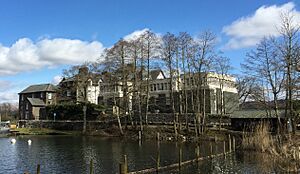Freshwater Biological Association facts for kids
The Freshwater Biological Association (FBA) is a science group that studies freshwater environments. It was started in 1929 in Cumbria, England. Scientists like Felix Eugen Fritsch and William Harold Pearsall helped create it.
The FBA's main goal is to help manage freshwater places like rivers and lakes. They want to make sure these places stay healthy for a long time. They do this by using the best science available. The FBA works with other groups, such as the Natural Environment Research Council.
The FBA helps freshwater science in many ways. They do new research and keep special science tools ready. They also hold science meetings and publish books and guides. They give expert advice on freshwater issues.
In 2010, the FBA had many collections of scientific information. This included published and unpublished studies. They also had two special libraries and lots of long-term data. This data came from important science sites. By March 2020, the FBA had 15 employees, 6 trustees, and 3 volunteers.
A group of trustees helps guide the FBA. These trustees are chosen by the FBA's members. They make sure the FBA follows its goals as a charity. The FBA is a registered charity in England.
What the FBA Does
The FBA is involved in many activities to support science. They use their locations in the Lake District in Cumbria and by the River Frome in Dorset. These places help them do scientific work. They offer special tools and equipment for research.
The FBA also supports new research. They give money and scholarships to young scientists. They also provide information services. This includes their freshwater libraries and a collection called "FreshwaterLife." They also have a special reference collection called "The Fritsch Collection." The FBA publishes many guides and reports about freshwater information.
The FBA also holds meetings and courses. These help people learn more about freshwater biology. They have an Annual Scientific Meeting each year.
In September 2008, the FBA started a series of conferences. These meetings focus on aquatic biology, which is the study of life in water. The first conference was about "Multiple Stressors in Freshwater Ecosystems." This looked at different problems affecting freshwater. The second conference, in April 2010, was about "Integrated Catchment Management." This topic focuses on managing whole river systems.
Important Scientists
Many important scientists have worked with the FBA. Here are some of them:
- Clifford H. Mortimer (1911–2010): He studied the chemistry of lake water starting in 1935. After a break, he became a physical limnologist, studying the physical properties of lakes.
- Patricia H. Clarke (1919–2010): She held an important role after she retired.
- Rosemary Lowe-McConnell (1921–2014): She worked on projects to get food from fresh waters during wartime.
- John Walter Guerrier Lund: He worked with the FBA from 1944 to 2005.
- Charles Oldham (naturalist) (1868–1942): He was a member of the FBA's council.
- Winifred Pennington (1915–2007): She was a pioneer in studying paleolimnology at the FBA. This is the study of past lake environments.
- Winifred Frost (1902–1979): She worked there from 1938 to 1979. She left money to the FBA to fund scholarships for students.
- Charlotte Kipling (1919–1992): She was a statistician who worked there from 1947. She wrote some papers with Winifred Frost.
- Steve Ormerod: He was a past member of the FBA's council.
- T. T. Macan (1910–1985): He worked there from 1935 to 1976. He later became the deputy director.
- Eville Gorham (1925–2020): He was a researcher from 1954 to 1957. He studied topics like acid rain and nuclear fallout.
Leaders of the FBA
The FBA has had many important leaders over the years.
Council Chairs have included:
- Cecil Terence Ingold from 1965 to 1974.
- Gordon Elliott Fogg (1919–2005) from 1974 to 1985.
Presidents have included:
- Sir John Gray (1918–2011) from 1983 to 1987.
- Sir Frederick George Thomas Holliday (1935–2016) from 1995 to 2002.
- Sir Martin Holgate (born 1931) from 2002 to 2017.
- Professor Louise Heathwaite from 2017 to 2022.
Directors have included:
- E. Barton Worthington: He was the first full-time director of the FBA from 1937 to 1946.
 | Madam C. J. Walker |
 | Janet Emerson Bashen |
 | Annie Turnbo Malone |
 | Maggie L. Walker |


